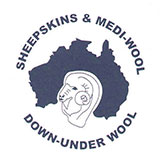What Is Wool and What Makes It So Special?
2nd Jan 2025
You have certainly heard of wool, but do you know what it is? Is wool better than other fibers? Well, wool is a versatile, natural, renewable, and biodegradable fiber with numerous applications. Keep reading because we will discuss wool fiber and its benefits; in this blog.
What is Wool?
Wool is a textile fiber derived from sheep and other animals. This includes goats' cashmere and mohair, muskoxen's qiviut, bison's hide, and fur apparel, rabbits' angora, and camelids' different varieties of wool. Most sheep breeds – or types – produce wool naturally. They must be shorn – or have their wool trimmed – at least once a year by a professional shearer.
Wool is the smooth, wavy, or curly undercoat of numerous hairy mammals, particularly sheep. It is
made up of a matrix of keratin fibers and covered with minute scales. - Merriam Webster

According to the Food and Agriculture Organization of the United Nations (FAO), the top three producers of global wool are China (19%), Australia (16%), and New Zealand (8%) as of 2020. Nonetheless, organic wool mostly comes from Australia and China.
Merino, Rambouillet, Nor Bouillet, Corriedale, and Finn wool fibers are fine and wearable next to the skin. In contrast, Romney, Jacob, Bluefaced Leicester, and milk sheep wool fibers are more durable and suited for layering clothes.
Wool can be used to produce carpets, clothes (socks, sweaters, shawls), and medical, industrial, and household products. However, the attributes of wool, such as flexibility, staple length, diameter, reliability, feet ability, uniformity of fleece, intensity, and luster, will determine its use.
What Are The Benefits Of Wool?
Wool is a protein fiber with scales and crimp that make spinning yarn simpler since the fibers interlock rather than slide loosely against each other. The fact that wool is crimped and elastic makes it different from fur.
In addition, below you will find a list of some of the benefits of wool that make it so valuable.
- Sustainable and biodegradable— wool is a renewable and sustainable resource as sheep grow new fleece every year. Also, wool is biodegradable as it decomposes naturally and provides nutrients for the soil.
- Keeps you dry— Wool fabrics drain moisture away from your skin and can absorb up to 30% of their weight before you ever notice you are wet. Then, this moisture is evaporated from the fabric.
- Breathable & insulate— wool promotes airflow, thereby absorbing water and sweat and reducing body odors. Further, wool fiber allows tiny air pockets to trap heat. Thus, it regulates body temperature, which means it keeps our body cool in overheating and warm in low temperatures.
- Absorb water— Wool fibers can absorb over a third of their own weight in water, making wool materials great wickers.
- Flexible— Wool fibers are also pliable; thus, wool fabrics keep their shape over time. Moreover, if you take proper care of wool fabrics, they can last a lifetime.
- Flame resistant— Wool may ignite at higher temperatures, but it has a slower rate of flame spread, heat release, and combustion heat, and it does not melt or drip. Additionally, it produces an insulating and self-extinguishing char, releasing fewer hazardous gasses and smoke.
- Anti-allergenic— Wool fibers are processed to reduce natural allergens. Wool is a suitable fiber for allergy and asthma patients because wool reduces moisture and temperature.
- Noise resistant— Wool can absorb sound like some other materials.
- Machine washable and dryable— there were days when people used to wash their wool fabrics with their hands as they might shrink due to machine washing. Nevertheless, most wool fabrics are now machine washable and dryable.
Is Merino Wool A Better Choice Than Other Wools?
Merino wool is the most popular type of wool in the world. Australia and New Zealand are the primary producers of merino wool, which comes from merino sheep that were originally bred in Spain. Wool has unique qualities that are not found in other fibers. Even so, no one can match the benefits of merino wool without the use of chemicals or modification.
There are over 200 breeds of sheep, but merino wool is the softest and finest wool as it has 40 crimps per centimeter. The number of crimps dictates the fineness of the wool. It is well-known for its luxurious comfort, strength, natural versatility, and functionality. Merino wool has practically everything you might desire, including luxury, functionality, and environmental friendliness.
Additionally, Merino wool is easy to maintain, capable of cleaning itself (killing bacteria and odor and removing stains), wrinkle-free, and machine washable. Also, Merino wool is incredibly soft, has luxurious luster, absorbs moisture, provides ultimate comfort, regulates temperature, dries quickly, and there is no need to wash it after every use.
Therefore, merino wool is an excellent choice for next-to-skin clothing and medical products because it provides extra comfort. Also, merino wool products maintain temperature, moisture, and pressure; thus, preventing rashes and bed sores in people. Further, you can get your merino wool products by Down-Under Wool for additional comfort and bed sore prevention, here.
Summary
Wool is a natural, soft, flexible, durable, and sustainable fiber. It has some remarkable benefits, including water resistance, hypoallergenic, lower flammability, flexibility, and machine washability. However, merino is the most commonly used wool around the globe as it provides luxury coupled with functionality and practicality.
Have you been persuaded to wear merino wool for comfort, pressure regulation, and moisture absorption? We share your sentiments. Check out Merino wool products by Down-Under Wool on our online store!
You have seen some of our products in the Blog. To see others, click: MORE

